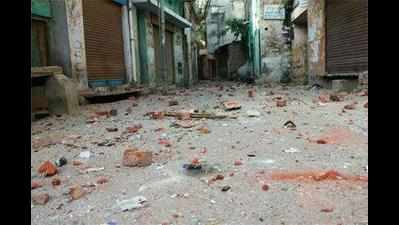- News
- City News
- meerut News
- 'We're victims of our own exodus,' riots refugees condemn NHRC Kairana report
Trending
This story is from September 24, 2016
'We're victims of our own exodus,' riots refugees condemn NHRC Kairana report

MEERUT: Liaqat Ali, who now lives in Kairana, remembers how he barely made it out of his village alive. Three years ago, a mob made its way into Shamli district’s Bawri village and chopped off his foot. He later limped to Kairana because he thought of it as an "oasis of communal harmony" during a time of conflict.
Ali these days tackles his disability while trying to earn a living for his family, but the National Human Rights Commission (NHRC) report on an alleged "Hindu exodus" has him worried.Days after NHRC blamed worsening law and order on riot-displaced families who settled in Kairana in 2013, Ali said the uprooted lot were "victims of their own exodus". Liaqat is not alone in all this.
Other families told TOI that far from being “criminals”, they were only trying to rebuild their lives. NGOs working for the rehabilitation of riot-refugees in Muzaffarnagar and Shamli also hit back at NHRC and said there were no gangs being operated by riot-refugees.
“I live with my wife and five children in Kairana now. Only we know how we survived the massacre. They (the mob) entered our house and hacked my right foot off. We managed to get out of the village alive but that incident changed my life forever. I now ride a rickshaw in Kairana for a living but I don’t get that many passengers," Ali said. "I heard about the report which said that riot-refugees are criminals. It is far from the truth. What crime will we commit? We are the victims here.”
Mohammed Nadeem, a riot-victim who settled in neighbouring Kandhla, said, “Our family used to live in Lisarhi village in Muzaffarnagar district. Back in the village, I owned a motorcycle repair shop. We weren’t crorepatis but we lived a comfortable life. Everything changed after the riots. We were forced to flee the village on the night of September 7, 2013. That was when the violence was at its peak. I don’t even know what became of my shop. We don’t have the time to join gangs. We have to feed our families.”
Local NGOs, too, questioned the NHRC report. “There isn’t a single gang in Shamli district where the ring-leader is a riot-refugee. This is an attempt to communalize crime. Crime doesn’t have a religion. There are gangs run by members of other communities also. Does that mean everyone from that community is a criminal? We will protest against the NHRC report,” said Akram Akhtar Chaudhary, project manager at Afkar India Foundation, a Kandhla-based NGO that works for the rehabilitation of riot-refugees.
Ali these days tackles his disability while trying to earn a living for his family, but the National Human Rights Commission (NHRC) report on an alleged "Hindu exodus" has him worried.Days after NHRC blamed worsening law and order on riot-displaced families who settled in Kairana in 2013, Ali said the uprooted lot were "victims of their own exodus". Liaqat is not alone in all this.
Other families told TOI that far from being “criminals”, they were only trying to rebuild their lives. NGOs working for the rehabilitation of riot-refugees in Muzaffarnagar and Shamli also hit back at NHRC and said there were no gangs being operated by riot-refugees.
“I live with my wife and five children in Kairana now. Only we know how we survived the massacre. They (the mob) entered our house and hacked my right foot off. We managed to get out of the village alive but that incident changed my life forever. I now ride a rickshaw in Kairana for a living but I don’t get that many passengers," Ali said. "I heard about the report which said that riot-refugees are criminals. It is far from the truth. What crime will we commit? We are the victims here.”
The NHRC report vindicated the stand of Kairana’s BJP MP Hukum Singh, who had claimed that 250 Hindu families had fled the town due to fear from members of “another community”.
Mohammed Nadeem, a riot-victim who settled in neighbouring Kandhla, said, “Our family used to live in Lisarhi village in Muzaffarnagar district. Back in the village, I owned a motorcycle repair shop. We weren’t crorepatis but we lived a comfortable life. Everything changed after the riots. We were forced to flee the village on the night of September 7, 2013. That was when the violence was at its peak. I don’t even know what became of my shop. We don’t have the time to join gangs. We have to feed our families.”
Local NGOs, too, questioned the NHRC report. “There isn’t a single gang in Shamli district where the ring-leader is a riot-refugee. This is an attempt to communalize crime. Crime doesn’t have a religion. There are gangs run by members of other communities also. Does that mean everyone from that community is a criminal? We will protest against the NHRC report,” said Akram Akhtar Chaudhary, project manager at Afkar India Foundation, a Kandhla-based NGO that works for the rehabilitation of riot-refugees.
End of Article
FOLLOW US ON SOCIAL MEDIA










